
Childcare expansion: Urgent Budget boost needed to deliver on Government’s plans
Government funding for the existing childcare offer is not keeping pace with rising costs, with wage bills up by 14.4% from April compared with a 4.6% rise in funding rates.
National Day Nurseries Association (NDNA) surveyed respondents across 448 private, voluntary and independent nurseries in England and discovered that the funding rate rise in April will not even cover hikes in minimum wages for nursery staff.
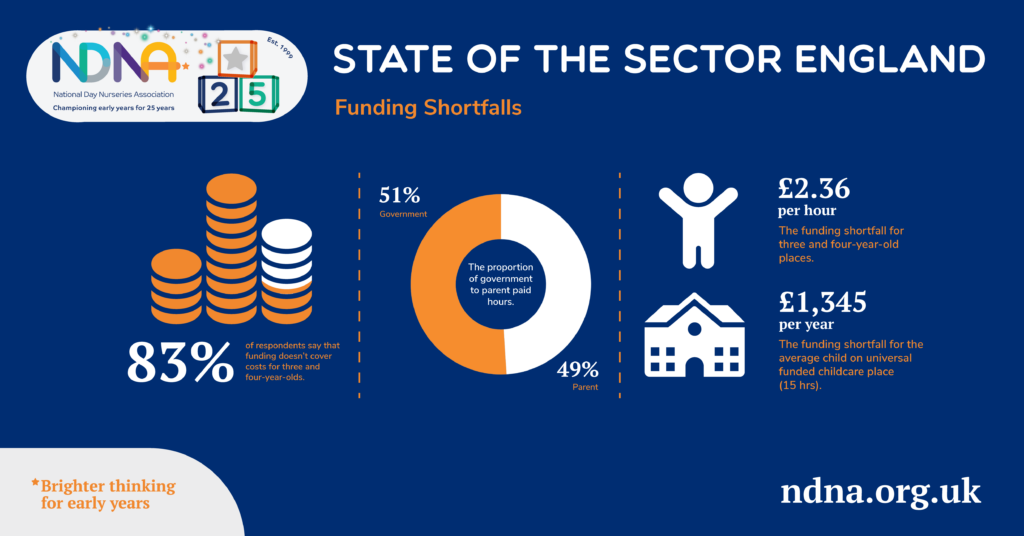
This has led to 83% of nurseries saying their costs are higher than the funding for three and four-year-old places. Their average shortfall is a staggering £2.36 per hour per child or £1,345 over the year for a 15-hour place.
In September the Department for Education (DfE) boosted the funding rate for two-year-olds but 59% of nurseries who responded to the survey still have a shortfall, with the average gap of £1.69 per hour per child.
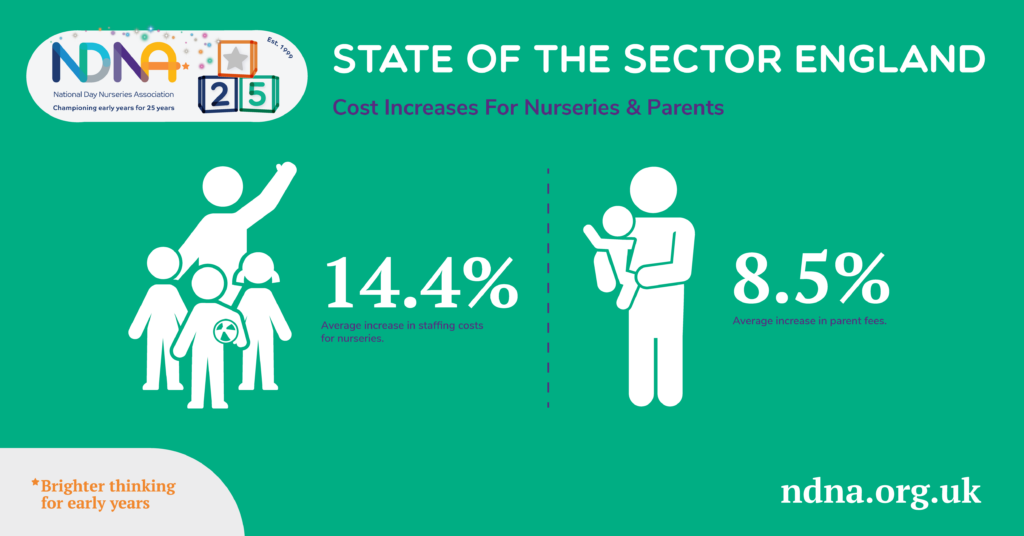
The survey also found that early years providers were keeping fee increases below their rising costs. The average increase in bills to families was 8.5%, compared with a 14.4% increase in staffing costs. This is largely as a result of statutory minimum wage rises and efforts to retain more qualified and experienced staff.
As a result, 73% of respondents expected to make a loss or break even this year. The situation in areas of deprivation was worse where 50% expected to make a loss. These areas typically have a greater reliance on Government funded income so any shortfall is harder to make up.
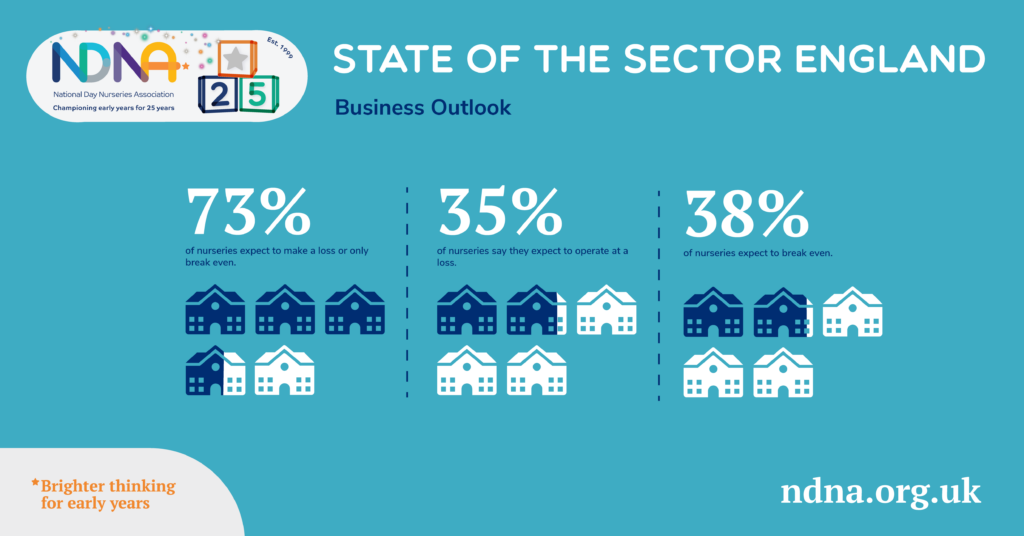
Purnima Tanuku OBE, Chief Executive of National Day Nurseries Association (NDNA), said: “As part of our annual business survey, we have taken the temperature of the early years sector at this crucial time. We found it needs a boost in the Budget to help providers to be sustainable before they can expand to deliver on the Government’s ambitious promises.
“A year ago when the Chancellor announced his expansion plans, the key aim was to boost the economy by supporting working parents. But a week before this year’s Budget, we now know that the majority of early years settings cannot commit to offering additional two-year-old places.
“We have been calling for the Government to address underfunding for years. We can clearly see that increasing hourly rates can have a positive impact with a fall in the numbers of providers saying they cannot cover their costs. However, for the vast majority the hourly rates are still not keeping pace with rising costs.
“The early years sector is creative, committed and adaptable. We know providers and staff will do all they can to give children the best start in life at this crucial stage of development. As part of this, providers are keeping fees well below the increases they are seeing in their staffing costs.”
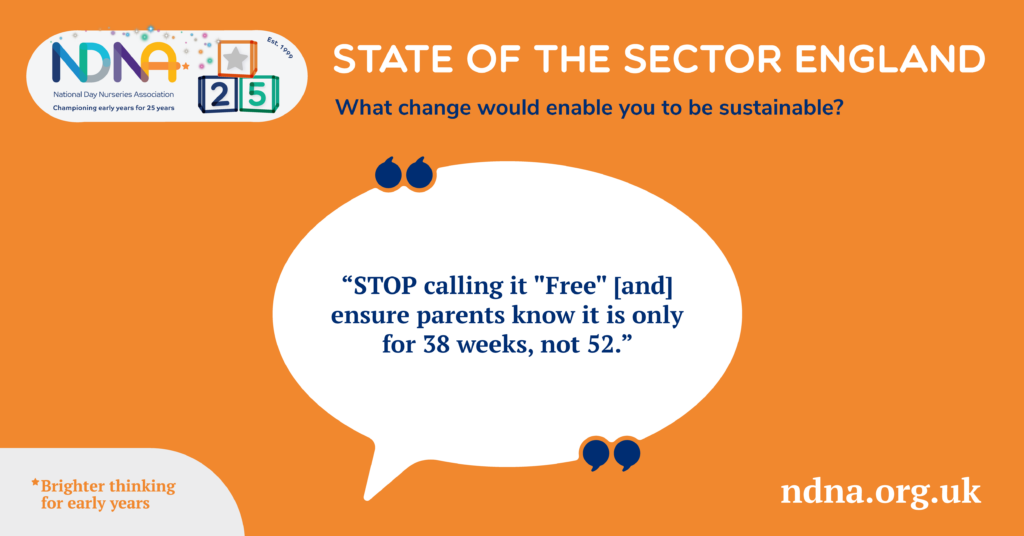
The Chancellor announced last March that all two-year-olds of working parents would be able to access 15 hours of funded childcare from April 2024, so the survey also asked nurseries about expanding their offer.
More than half of nurseries are unsure whether they can offer additional places to two-year-olds from April, putting the Government’s flagship childcare promise in doubt. A total of 54% of respondents said they were unlikely to offer any additional places to two-year-olds or were still not sure if they could. In addition, 56% of respondents said they could not meet local demand for places. This could leave families disappointed and children missing out on the offer.
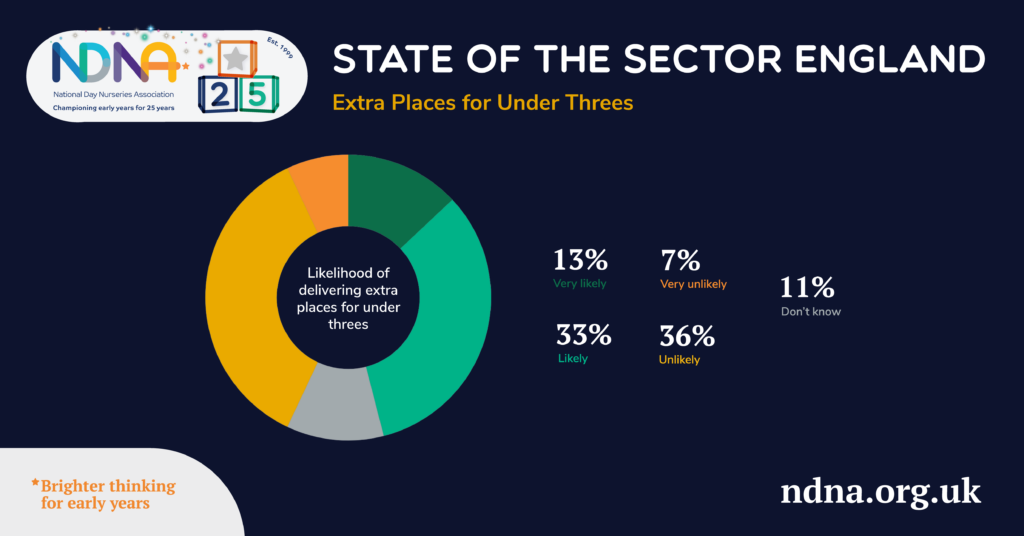
When asked about the possibility of extending their settings, 54% could physically expand if they had access to capital grant funding. Unfortunately, 38% could not increase their capacity because they couldn’t get sufficient staff.
NDNA asked what nurseries needed in order to be sustainable and nearly all responses referred to needing a funding rate that enabled them to pay attractive staff wages. Many also said it would help if the Government stopped calling the places ‘free’ because they are not free for parents or providers.
Purnima added: “The proportion of settings who are operating at a loss or just breaking even is not sustainable. We have already seen closures increase and without addressing underfunding this will only get worse. We all want to see children being able to access high-quality early education and care because this makes all the difference to their life chances, but this cannot be done on the cheap.
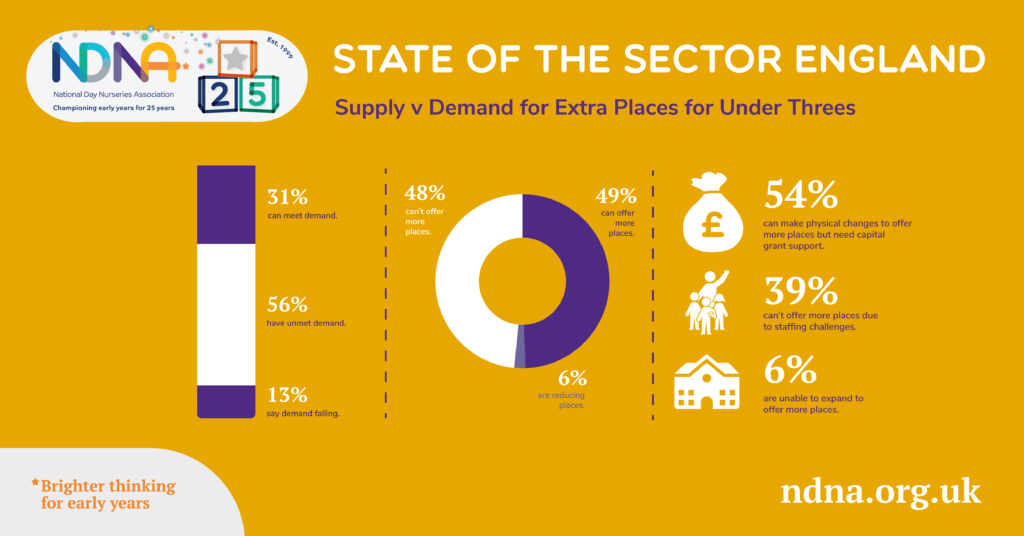
“The Chancellor must address the huge challenges facing early years providers and focus on measures to support them. We need sustainable funding rates, the removal of unfair business rates and more capital support if providers are going to survive and thrive. This is the only way that nurseries can plan for a sustainable future and be able to deliver the increased childcare offer being made to parents.”
Full results from NDNA’s Annual Business Performance Survey 2024:
- 14.4% – average staffing bill increase from April 2024
- 8.5% – average fee increase to parents from April 2024
- Business performance: 34.8% expect to make a loss this year; 37.5% expect to break even
- Business performance in the 30% most deprived wards: 50% expect to make a loss; 28.7% expect to break even
- 83% of respondents say the hourly funding rate for three and four-year-olds does not cover their costs – this increases to 86.6% for nurseries in areas of deprivation
- The estimated average shortfall for three and four-year-olds is £2.36 per hour per child (in 2023 it was £2.31)
- 58.9% of respondents say that the two-year-old funding does not cover their costs – the average shortfall is £1.69 per hour per child
- The average nursery has 51.4% of government-funded children and 48.5% of parent-paid children – this is ahead of the childcare entitlement expansion
- This rises to 54.8% of government-funded children in nurseries in areas of deprivation
- Those likely to be offering additional places to under threes from April – this is analysed by each setting represented by each respondent: 6.7% very unlikely; 36.1% unlikely; 11.1% don’t know; 32.5% likely; 13.3% very likely
- 49.3% of total settings represented by responses said they could increase their capacity; 48.4% cannot increase their capacity; 2.2% are reducing capacity
- 55.8% of total settings cannot meet local demand; 31% are meeting demand; 13.1% say demand is falling
- 53.7% of total settings need capital grant support to expand their capacity; 38.3% have staffing challenges so cannot offer more places; 6.2% are unable to expand
- The survey ran throughout January 2024; responses covered 448 PVI settings delivering an estimated 25,000 children’s places across England
- England
Similar Articles
What are the changes to Government guidance and what is NDNA doing to support members?

Government research shows school-based nurseries are not delivering flexible provision to its communities


